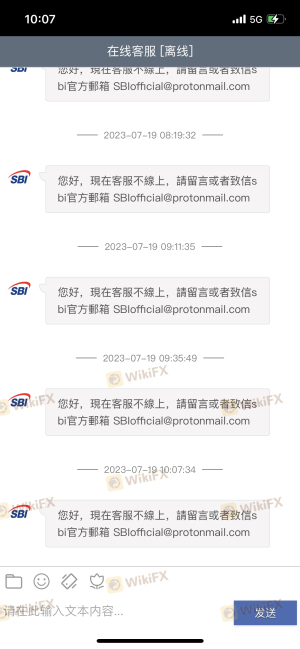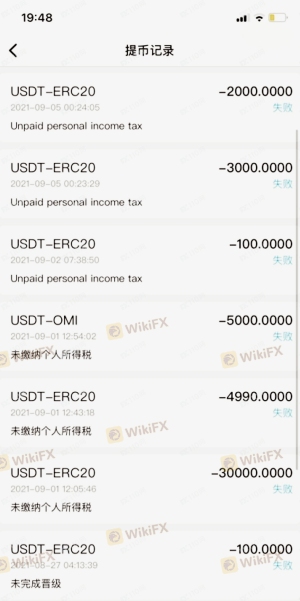Is SBI Holdings safe?

Pros
Cons
Is SBI Holdings Safe or a Scam?
Introduction
SBI Holdings, a prominent player in the forex market, is a Japanese financial services company that provides various financial products and services, including online trading. With the increasing number of forex brokers available, traders must be cautious when evaluating their options. The potential for scams and unreliable platforms is significant, making it essential for traders to conduct thorough research before committing their funds. This article aims to provide an objective analysis of SBI Holdings by examining its regulatory status, company background, trading conditions, client fund safety, customer experiences, platform performance, and overall risk assessment.
Regulation and Legitimacy
The regulatory framework governing forex brokers is crucial for ensuring the safety and security of traders. In the case of SBI Holdings, it is important to note that the company is not regulated by any major financial authority. Below is a summary of its regulatory status:
| Regulatory Authority | License Number | Regulatory Region | Verification Status |
|---|---|---|---|
| Financial Services Agency (FSA) | N/A | Japan | Not Regulated for Forex Trading |
The lack of a valid forex trading license raises significant concerns about the safety of trading with SBI Holdings. While the company is regulated by the FSA, it is important to highlight that this regulatory body does not oversee forex trading specifically. This means that SBI Holdings is not subject to the same rigorous standards and oversight that regulated forex brokers must adhere to. Consequently, traders may find themselves at a higher risk when dealing with unregulated brokers, as they lack the legal protections typically afforded to clients of regulated entities.
Company Background Investigation
SBI Holdings has a rich history dating back to its establishment in 1999. Originally known as Softbank Investment Corporation, the company has evolved into a diversified financial services provider. Its ownership structure is primarily composed of the SBI Group, which engages in various sectors, including banking, securities, and asset management. The management team, led by CEO Yoshitaka Kitao, has extensive experience in finance and investment, which adds a layer of credibility to the company.
However, the transparency of SBI Holdings remains a concern. While the company provides some information about its operations, the lack of detailed disclosures regarding its financials and business practices raises questions about its commitment to transparency. This opacity can lead to uncertainty for potential investors and traders, making it difficult to assess the overall reliability of the company.
Trading Conditions Analysis
When evaluating the trading conditions offered by SBI Holdings, it is essential to consider the overall fee structure and any potentially problematic policies. The following table summarizes key trading costs associated with the broker:
| Fee Type | SBI Holdings | Industry Average |
|---|---|---|
| Spread on Major Currency Pairs | Variable | 1.0 - 2.0 pips |
| Commission Model | No Commission | Varies by Broker |
| Overnight Interest Range | High | Moderate |
SBI Holdings has been criticized for its relatively high spreads compared to industry averages. This can significantly impact traders, particularly those engaged in frequent trading. Additionally, the absence of a clear commission structure raises concerns about hidden fees that may be applied to trades. Such practices can erode potential profits and create distrust among traders, leading to questions about whether SBI Holdings is safe for trading.
Client Fund Safety
The safety of client funds is paramount when evaluating any forex broker. In the case of SBI Holdings, the company claims to implement various measures to ensure the security of client funds. However, the lack of regulatory oversight raises concerns about the effectiveness of these measures.
SBI Holdings does not provide clear information regarding fund segregation, investor protection schemes, or negative balance protection policies. Without these safeguards, traders may find themselves at risk of losing their investments in the event of a company failure or financial mismanagement. Historical safety issues or disputes have also been reported, further underscoring the need for caution when considering SBI Holdings as a trading partner.
Customer Experience and Complaints
Analyzing customer feedback is crucial in assessing the overall experience of traders with SBI Holdings. Many users have expressed dissatisfaction regarding the broker's customer support and responsiveness. Common complaints include:
| Complaint Type | Severity Level | Company Response |
|---|---|---|
| Withdrawal Issues | High | Slow Response |
| Poor Customer Support | Medium | Inconsistent |
| Misleading Trading Promises | High | Limited Resolution |
Several traders have reported difficulties in withdrawing their funds, which is a significant red flag when determining if SBI Holdings is safe. Slow response times and a lack of resolution for complaints can lead to frustration and distrust among clients. The severity of these complaints suggests that potential traders should exercise caution and consider the experiences of others before engaging with SBI Holdings.
Platform and Trade Execution
The performance and reliability of a trading platform are critical factors for traders. SBI Holdings offers a trading platform that is generally user-friendly; however, there have been reports of issues related to execution quality. Traders have noted instances of slippage and order rejections, which can negatively impact trading outcomes.
Additionally, concerns about potential platform manipulation have been raised, further complicating the assessment of whether SBI Holdings is safe. The lack of transparency regarding execution practices and potential conflicts of interest can create an environment of uncertainty for traders.
Risk Assessment
When considering the risks associated with trading through SBI Holdings, it is essential to evaluate various factors that may impact the overall trading experience. The following risk assessment summarizes key areas of concern:
| Risk Category | Risk Level (Low/Medium/High) | Brief Description |
|---|---|---|
| Regulatory Risk | High | Operating without major regulatory oversight increases risk exposure. |
| Financial Stability Risk | Medium | Lack of transparency regarding financial practices raises concerns. |
| Customer Service Risk | High | Frequent complaints about support and withdrawal issues create distrust. |
Given these risks, traders should carefully consider their options and be aware of the potential pitfalls associated with trading through SBI Holdings. It is advisable to implement risk management strategies and only invest funds that one can afford to lose.
Conclusion and Recommendations
In conclusion, the evidence presented suggests that SBI Holdings may not be the safest option for forex trading. The lack of regulatory oversight, high trading costs, and numerous customer complaints raise significant concerns about the company's reliability. While SBI Holdings has a long history and a reputable management team, these factors alone do not mitigate the risks associated with trading through an unregulated broker.
For traders seeking to engage in forex trading, it is recommended to consider alternative brokers that are regulated by major financial authorities and offer transparent trading conditions. Some reliable alternatives include brokers such as IG, OANDA, and Forex.com, which provide a safer trading environment and greater peace of mind. Ultimately, it is crucial for traders to conduct thorough research and exercise caution when selecting a forex broker to ensure their investments are protected.
Is SBI Holdings a scam, or is it legit?
The latest exposure and evaluation content of SBI Holdings brokers.


SBI Holdings Similar Brokers Safe
Whether it is a legitimate broker to see if the market is regulated; start investing in Forex App whether it is safe or a scam, check whether there is a license.
SBI Holdings latest industry rating score is 1.58, the higher the score the safer it is out of 10, the more regulatory licenses the more legitimate it is. 1.58 If the score is too low, there is a risk of being scammed, please pay attention to the choice to avoid.